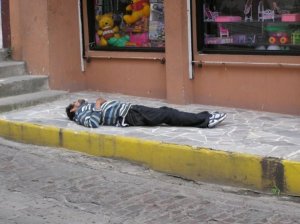
I can’t tell you how many posts and articles I’ve read by established authors who make a living writing books who basically say they don’t know what they’re doing. Wendig just did it again, and he does it a lot. Stephen King did it in On Writing.
Did what?
Made the statement that they pretty much have no idea why they are successful.
Well that sucks.

Now, you as a writer may take that as very discouraging. If you were a trainee at a 9 to 5 job and the boss said – repeatedly – that she had no idea how to show you how to be successful at that job, you’d probably quit. You probably should quit. I’m not flying in an airplane where the pilot says he has no idea how he manages to not crash every time he flies. I wouldn’t hire a firefighter with ten years of experience who said she was clueless how they ever managed to put out burning houses.

If you heard that at your workplace, maybe you’d decide you had an incompetent boss. Maybe you’d think well, if nobody knows how to do it, and they make money at it, it must be easy. Or they are all just lucky.
Why can’t the successful authors tell you how to do it?
Or do they secretly not want you to know?

They admit to some things. Hard work and luck, is basically what it comes down to. That’s the message I glean from these successful authors.
Emphasis on the luck part.
Great. Cos I’m known for my fantastic luck. Why, I won the lottery twice just last year – just like you? Ready for that old gem “The harder I work the luckier I get?” Riiiiiiiiight…

It’s not just true in book writing, either. Comedian Richard Lewis said in an interview that he was lucky. He’d been a stand up comedian, been in movies, had a successful TV show – and he sad that there were other people just as talented who never went anywhere. His advice for young people coming up? “Whether you’re a stand up or a dancer, practice your craft and hope for a break” Translation: a little luck. As in, I’m not really sure why I made it.
Ugh.
But here’s some hope:
Megyn Kelly was a successful lawyer who walked away from it all to become a TV journalist. She now hosts one of the most successful news-opinion TV shows in the country. She’s humble, so she doesn’t deny that luck played a role, but she definitely attests to the ingredient of hard work – and not settling for less. That, she says, she learned from Dr Phil, who says the difference between you and somebody you envy is: you decided to settle for less. Maybe luck wears a different mask sometimes. Settling for less also means going that extra mile.
With those words serving as her epiphany, Megyn started a new course, away from law and toward TV journalism. That only sounds easy in retrospect. She wasn’t famous when she made that move.
Stack those things up and a form begins to take shape. The more art-driven the field, the less the successful people admit to knowing why and how they did it. The more analytical the field, the more the successful people know, right down to the daily routines, how to be successful. There are stacks and stacks of business books telling you how to be successful in business. STACKS.

Being a successful author is a business.
Let me wait for the boos to die down.
It’s a business. We measure the success of an author by the amount of money made or the number of books sold. Period.
Okay – gulp – so…
So wake up. The more business skills you bring to analyze what works and what doesn’t, the closer to success you’ll get.
But I don’t have business skills! I’m an artist!
What crap. It’s a balance. Just recognize that. Don’t sell your soul. Nobody’s saying to go chase after the next angst-filled teenage vampire story – unless that is what absolutely drives your soul. Then, do it for all you’re worth – with come caveats. (We’ll get to those.)
I had a lot of advice for a young friend of mine who wanted to be an artist. She was trained as a painter-type artist, and she wanted to do that as a career. (Not as a starving artist, but as a successful artist.) I saw lots of art shows downtown, and vendors with booths on street corners on a Saturday, and artsy friends with cool websites. I encouraged her to do those things. I knew from my corporate job where we occasionally did home shows and events that those booths can be rented by just about anyone, so you didn’t have to be a “real” artist to take part in a sidewalk art fair down town. You’ll sell some stuff and you’ll network.
Mostly, you’ll learn what not to do next time. (Learn about that here https://atomic-temporary-57188753.wpcomstaging.com/2015/01/13/should-you-participate-in-a-book-fair-three-points-to-consider/ )
But it’ll be fun. Because after about an hour, you discover that the guy in the next booth doesn’t know what he’s doing, either. By the end of the event, you’ll find that most of the attending artists don’t. They don’t know why an event is successful or not, or why they sell a lot of stuff at one event and almost nothing at the next one.
And when she didn’t choose to do those things, I wondered if she settled for less? She did well for a while, but she’s not an artist today. That artist in the booth on a hot Saturday was doing what was necessary. The author going to do a reading at a small restaurant was doing what was necessary. The ones who do book fairs are doing what’s necessary. The ones who write blogs that nobody reads, the ones that work Facebook and twitter and Instagram and the rest of it – are they pursuing their passion harder than you, and that’s what makes them appear lucky when they make it?
Here’s another thing to consider. When we did corporate events, some were good, some were bad. We analyzed the hell out of it, though, to learn why and to not repeat mistakes. We didn’t attend too many bad events.

Artists aren’t known for their analytical skills. Neither are most stand up comedians, dancers, or writers. (Their agents theoretically are, though. But many author folks say that’s not true, either.) But those happy souls who learn to write and market and do events and analyze results and learn from their mistakes will be more successful than those who don’t analyze things and don’t learn from their mistakes.
And that’s the lesson I take from the big authors who profess that they don’t know what they’re doing, that they don’t know why they are successful. They’re not analytical enough to define it, and they have a sense of artistry that maybe the rest of us can’t quite define. (Can you lack talent and be successful? Of course. Look at “50 Shades of Gray.”) We can’t all paint like Rembrandt. We can’t all write like Stephen King. But while those two examples may have been born with talent, they had something else. They developed that talent.
And they persevered.
They got discouraged. They had bad days. They weathered those tough times. At one point while King was writing “Carrie” – his first successful book – he threw it in the trash. It’s safe to say he was feeling a bit low at the time. But he didn’t quit writing. (And I can admit, I’m a fan, but there are a LOT of his books I don’t like. Some are unreadable, to me.)
Successful authors write a lot, not just 1 book and that’s it. It seems like many didn’t become successful until after book five or six. Can you hang in there while the first four books flop? (Can you? Five flops? Sure, if you know number six will put you on the map. But you don’t know, and number six may flop as well.)
They fake confidence until they make it, and many they still fake it after that.
They learned from mistakes and
They kept going. Even if they were discouraged, they keep going. Perseverance. Not settling for less. Not holding back from that extra mile when they’re tired.

There are oddball rules, too, about writing. Join a critique group and you’ll learn them in an hour. I say, write how you want, but understand that readers are conditioned to read a certain way, and those silly rules will help you with that. That doesn’t mean you’ll be successful, it means you won’t fail as badly the first few times. If you are crossing a big river, start with a boat, not a car. Yes, you can plug all the holes in the car and maybe make it across. It’s better to start with a boat. Don’t stand neck deep in the water explaining about how the car should have floated and that the water is unsophisticated. The one drop of water that understood, didn’t come in; the rest did. (And I say that as an author who has put several cars on the bottom of the river.)
“You’ll write some bad songs.”
That’s what a successful friend of one of the founders of the music band The Eagles told them. The struggling songwriter was worried; what if the songs I write are bad? His friend had the answer. “You’ll write some bad songs. But you’ll write some good songs, too.” The Eagles became one of the most successful bands ever. Doesn’t sound like that was in the cards from reading that first statement, where the guy obviously lacks confidence, does it?
Sound familiar?
You’ll write some bad books. Bury them and move on, but learn from what you did wrong and what you did right in that book. Give its demise an appropriate amount of thought, then walk away. Don’t rewrite it ten times. Write ten new books.
There’s somebody out there right now who has the same amount of talent as you, or maybe even less talent, the same or fewer connections, the same or fewer hours to write, but because they are willing to work harder and do things you won’t, and to learn to be smart about it all, they will be successful. Will you?

The next time you say to yourself “I should be doing that” – the terrorists win.
So here’s what it comes down to for me, and this will make zero sense if you didn’t read the 1600 words that came before this. (It may not make sense even if you did read it.)
Persevere. “You’ll write some good ones, too.” “Don’t settle for less.”
Don’t do what doesn’t work; try to do more of what does work. (Duh.)
Analyze things objectively. That’s the “duh” removal. How objective are you really being?
Write another book, because you need about five to get any notice at all. Some of us will need more than five. One guy needed seventeen years’ worth of books. I may need twenty.
Read more from good authors.
Know the difference between being stupid as opposed to being stubborn.
Don’t write one book and re-edit it forever.
There’s more, but that’s enough for one day. Okay, maybe one more:
Have a friend who you can vent to about all this, or vent it here.
What are you struggling with as an author? Let’s help each other. Nobody has to know it all.
.

Enjoy my writing brilliance in all its glory on my Author Page HERE http://www.amazon.com/Dan-Alatorre/e/B00EUX7HEU/ref=ntt_athr_dp_pel_pop_1
and find out about the release of my new book “25 Great eBook Marketing Tips You Wish You Knew” by emailing me at savvystories@outlook.com and I’ll let you know when you can get a free advance copy! Shh! Don’t tell.
7 replies on “Authors Don’t Know What They’re Doing”
This is awesome! Thanks for writing this. I needed to read this, especially today.
LikeLike
Glad I could help. Have a bad day, did we?
LikeLike
Fabulous post Dan. Sure there’s luck in anything which provides a helping hand, but the bottom line is what you write: keep writing, and perseverance. There’s no easy way around it. Determination is my best friend. Well said, and I’m so sharing! 🙂
LikeLike
I appreciate that. Too many people give up early in the process. We’ve all seen it!
LikeLike
Okay. I’m letting The Dead Game go. I edited twice after its original edit by the publisher. It is much better. But I let it go a few weeks ago. I learned from my reviews and subsequent edits. Once I removed all the extraneous words and adverbs, I was able to glimpse the story hidden beneath it all. I still have to work on the dialogue and never use the word “huge” again. So editing could be good but there is a limit where we must let go.
LikeLiked by 1 person
Ya gotta eventually let it go. But as for never using the word huge again, what if an elephant runs into the room?
LikeLike
He’ll just be humongous. If that’s how it’s spelled.
LikeLiked by 1 person